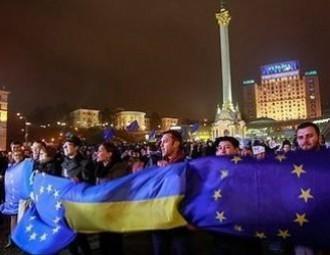Uladzimir Matskevich: Maidan revealed serious difference among post-Soviet political regim

Sunday results of Euromaidan in Kiev: hundreds of thousands protesters, fallen Lenin monument and ultimatum to dissolve the government in 48 hours set before Yanukovich by opposition. What is next?
In Kiev, confrontation between the authorities and the opposition remains tense. Thus, the March of millions that took place on December 8 resulted in even more severe requirements of the opposition to the government and no visible reaction on the part of President Viktor Yanukovich. What is next, and what are the reasons and consequences of the confrontation in Ukraine?
EuroBelarus Information Service asked Uladzimir Matskevich, the head of the Board of the International Consortium “EuroBelarus” to share his opinion on the issue.
- It is for the nine days already that Eurorevolution is going on; Euromaidan now has more than one and a half million people, despite or regardless of the bloodbath organized by “Berkut” police riot squads. Why do Ukrainians ready to fight to the bitter end for the Eurointegration?
- Frankly speaking, not so many people came to streets to protest against the decision of Azarov’s government not to sign the Association Agreement with the EU. The indignation of Ukrainians was caused by the dispersal of a demonstration immediately after the Vilnius Summit. These protests are directed against the government and against Yanukovich, not for Europe.
We shouldn’t confuse Eurointegration aspirations of Ukrainians with the will of the whole nation. But deceptive actions taken by Yanukovich, with his visit to Moscow on the eve of the Vilnius Summit and immediately after only urge on the people to radiate Euro-enthusiasm.
- Why do Ukrainians want to join the EU and are so afraid of the Customs Union? It looks like Euromaidan was recently provoked by the unconfirmed information about the Agreement of Association with the Customs Union, signed by Yanukovich in Moscow on December 6.
- Do not distort facts: Association Agreement with the EU doesn’t at all mean that you become a member of the EU. Customs Union can’t be compared with the European Union; they are way too different.
Ukrainians are indignant with behind-the-scenes Yanukovich’s politics. While people demand the government and the president to bear responsibility, Yanukovich is trying to solve the problems, being well aware that his actions will be approved neither by the people, nor by the parliament.
If the political process has been taking place in the form of dialog, no violent protests against the decision of the Ukrainian authorities would appear. I don’t think that each and every participant of Euromaidan has made a calculation of gains and losses from signing the Association Agreement with the EU and the Customs Union. People are indignant with the methods, not with the numbers. The pressure Russia exerts on Ukraine is obvious; and it cannot but irritate people.
Do you think that Eurorevolution can be successful?
- It depends on what we understand by success.
Despite the economic and general political crisis Ukraine is going through, such large-scale mass and long-term outburst of indignation was hard to predict.
Ukraine has rough parity of forces; so I see compromise as a positive civilized settlement of the conflict.
If force and behind-the-scenes games will be used to settle the situation, it will sooner or later cause another outbreak. Roughly speaking, such policy will disbalance the situation both in Ukraine and in the whole Eastern European region.
- Uladzimir Niakliaeu stated that Ukrainians are deciding the fate of Belarus. How valid is this statement?
- Of course, Ukrainians resolve their own problems. However, Ukraine is an important participant of all processes in the region, and Russia’s and EU’s attitude towards the region depends on Ukraine’s behaviour.
Belarusans have to resolve their problems themselves. Maidan has revealed a very serious difference of post-Soviet political regimes, and it is because of this difference that public protests and their forms differ.
During the impeachment in November 1996 there was no compromise, and that has almost caused a coup d'état. It is at that time when Belarus made fateful decisions. All further actions of the Belarusan authorities were uncompromising. The difference between Ukrainian and Belarusan regimes is rooted in those events.
We see how lively Ukraine, its civil society, opposition and Ukrainians are! Despite all the hardships, Ukraine is humming with activity. While in Belarus any activity is stopped.
-
03.01
-
07.10
-
22.09
-
17.08
-
12.08
-
30.09








































